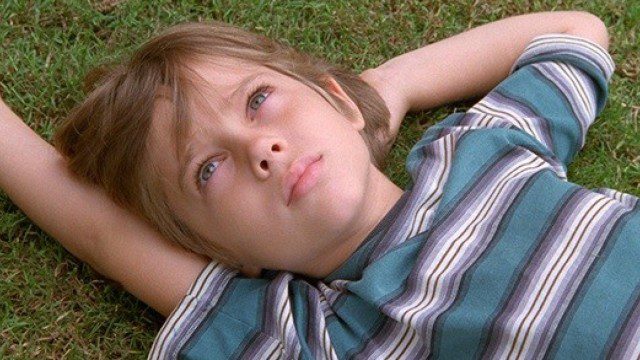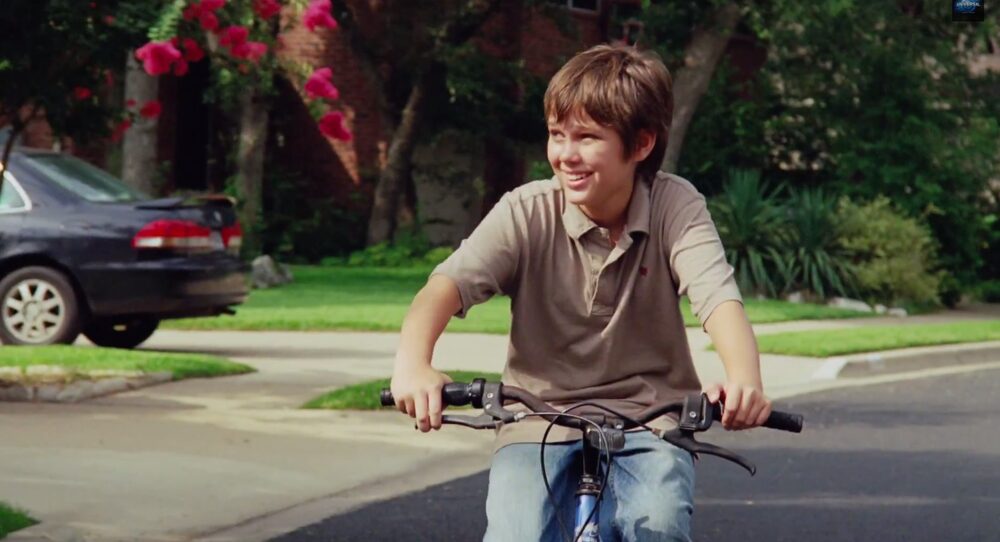Richard Linklater’s Boyhood is a film of boundless warmth, intelligence, joy, and depth. It’s also critically a work of staggering ambition and scope. We don’t watch as different actors step in the shoes of these characters as they age: in a truly audacious move that makes this picture unlike any you’ve ever seen before, Linklater spent twelve years filming the same children (including his own daughter) on their path to young adulthood The result is something that transcends coming of age tale formulas and clichés. Boyhood is, in its own free-flowing naturalistic way, as lyrical as a poem, and as honest and observational as a documentary.
The boy at the heart of the story is Mason. Played by Ellar Coltrane (who appeared in Linklater’s Fast Food Nation) he’s very much a typical kid: rather enamored of rocks and clouds, playing on swing sets, staring at lingerie models in catalogs (“Look at those!”), and fighting with his older sister, Samantha (Lorelei Linklater). Boyhood begins as they’re on the verge of leaving their small home for Houston so that Olivia, their mom (Patricia Arquette), can go to college. It won’t be their last time moving. And the marriage to one of her psychology professors, following a short engagement with the happy surprise that he’s a control freak and violent drunk, definitely won’t be forever either.
Boyhood captures with indelible precision the very lack of precision in life. Linklater sees a life constantly moving forward; a sprawling collection of moments in which we’re always in the spectacular now until it’s over. Scenes transition not merely to the next one or some advancement of a point in the narrative, but quite literally to the next year in these character’s lives. This is seen most starkly in the transformation of the two young stars who can suddenly look incredibly different than they did the scene or two before and somewhat counter-intuivitely give you some hints to where the movie is on its own timeline.
In terms of plot this has a deceptive simplicity, quite like his brilliant Dazed and Confused did. Linklater includes some big, crucial moments and scenes of hurt and intensity and those do stick. Mostly though he moves the movie forward with an accumulation of smaller moments that add up to something far greater (he’s one of the only American directors you could see being comfortable making European movies). You take in nearly voyeuristically the effortlessly smart and natural way Linklater-often working with his cast, including here-crafts dialogue that ranges from the brainy to the off-color and comedic. Importantly, the conversations feel real without ever sounding mundane. Whether it’s a motor-mouthed classmate chatting up Mason (she’s trying to get information without sounding like she’s up to something) or Mason and his dad (in a scene shot in 2008) talk about how unnecessary another Star Wars movie would be, we’re listening to what real people sound like, as written by a filmmaker with a genuine love and smart ear for language that’s basically unmatched.
The performances are pretty much all excellent. It’s remarkable to see Ellar Coltrane go from boyish to a brooding and pretty photographer-artist by the end of high school. This is exceptionally good acting (with his piercing intelligence and introspection even his quieter moments say a lot), as is the turn from Lorelei as his sister (we watch her go from bratty to cute and thoughtful). Patricia Arquette is affecting and frequently quite funny as their mom, forced to take on the enormous job of parenting almost completely alone. The supporting parts like Libby Villari as the grandmother or Marco Perella as the aggressive drunk with a disarmingly charming and pleasant exterior are great too (the only rough spot is Zoe Graham’s brittle, phony performance as Mason’s high school girlfriend, which feels telegraphed in from an entirely different movie). The highlight, arguably, is Ethan Hawke as their loving though occasionally absentee father. He spends their childhood wishing he hadn’t let their mother down and forced to contend himself with spoiling the kids every other weekend. Hawke is hilarious but also sweet and openhearted in the role. I found it to be his most affecting and perfect performance of all he’s given in a Richard Linklater movie, which means probably his finest period.
For all its imagery of childhood and growing up, Boyhood never descends into being some corny or self-indulgent piece. I think that’s in part because it’s set in the present (with an evolving soundtrack and the backdrop of some major national news stories), but also because fundamentally Linklater is making a movie both about a specific character and also more broadly growing up, not his own past. Unlike Terrence Malick’s The Tree of Life, this doesn’t reek of self-absorption and massive pretensions. He sees being a kid as a time of constant pauses and deferring to authority figures, delaying what you want to do (for family, for school, for building character, etc.) until the point where you graduate high school and for the first time you get to fully find and define yourself. It’s also, in its tender depiction of a single working mom’s dedication and burdens, notably, a work of profound empathy and feeling. Boyhood is a great and stunning film, but more than that it’s the rare picture that makes you feel like you might understand something about life that you didn’t before.


